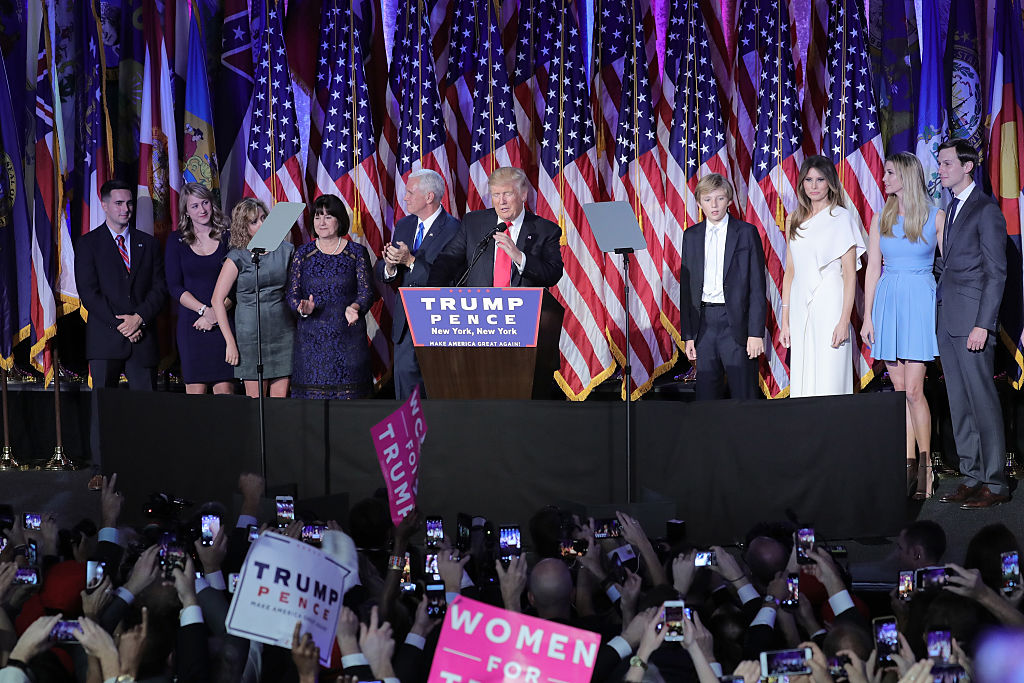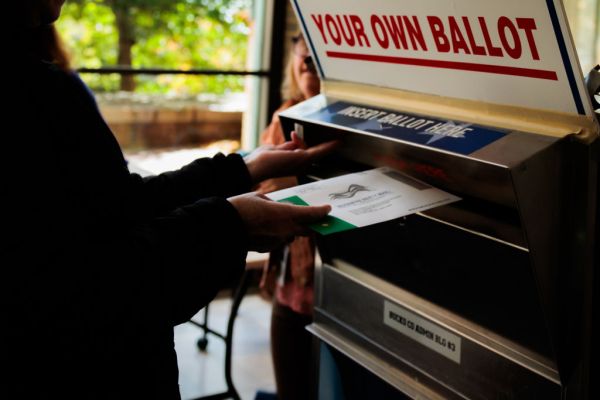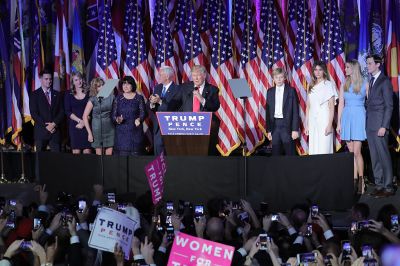Happy Wednesday! Apple is reportedly making a movie out of the classic Oregon Trail video game—though we’re not sure how since, as far as we know, everyone in the game dies of dysentery.
Quick Hits: Today’s Top Stories
- Vice President Kamala Harris delivered what her campaign described as her “closing argument” at the Ellipse near the White House in Washington, D.C., on Tuesday evening. In the address, Harris recalled former President Donald Trump’s speech there on January 6, 2021, that immediately preceded the attack on the U.S. Capitol, calling him “unstable, obsessed with revenge, consumed with grievance, out for unchecked power.” Harris condemned what she called Trump’s effort to “keep the American people divided and afraid of each other,” saying “that’s not who we are.”
- Meanwhile, on Tuesday evening, President Joe Biden scrambled to tweet a clarification after he appeared to refer to Trump supporters as “garbage” during a Zoom event with Voto Latino, a campaign organization. “Just the other day, a speaker at his rally called Puerto Rico a ‘floating island of garbage,’” Biden said, stumbling over his words. “Well let me tell you something: I don’t—I don’t know the Puerto Rican that I know—or the Puerto Rico where I’m—in my home state of Delaware. They’re good, decent, honorable people. The only garbage I see floating out there is his supporters. His—his—his demonization of Latinos is unconscionable and it’s un-American and totally contrary to everything we’ve done.” The White House quickly released a transcript of the remarks featuring a possessive apostrophe (supporter’s), and Biden claimed in a tweet after the interview he was referring solely to racial comments made by comedian Tony Hinchcliffe at a Trump rally over the weekend: “I referred to the hateful rhetoric about Puerto Rico spewed by Trump’s supporter at his Madison Square Garden rally as garbage—which is the only word I can think of to describe it. His demonization of Latinos is unconscionable. That’s all I meant to say. The comments at that rally don’t reflect who we are as a nation.” The Trump campaign quickly slammed the comments, with vice presidential nominee J.D. Vance tweeting that it is “disgusting” that “Kamala Harris and her boss Joe Biden are attacking half of the country.”
- Former President Trump on Tuesday campaigned in Pennsylvania, telling voters in the swing state with some 500,000 people of Puerto Rican descent that “we love” Puerto Rico in an effort to temper the blowback to the rhetoric at his rally at Madison Square Garden on Sunday evening. At a rally later on Tuesday in Allentown, Pennsylvania, which is majority Hispanic, he was joined by Republican Sen. Marco Rubio of Florida.
- Sen. J.D. Vance, the Republican vice presidential nominee, will reportedly sit down for an interview with podcaster Joe Rogan on Wednesday. The planned appearance follows former President Trump’s three-hour interview with the popular host, who has more than 17 million YouTube followers, last week. Rogan said he is still discussing an interview with Vice President Harris but the parties have not yet agreed on a time or location; Harris wanted Rogan to come to her, while Rogan requested to record the episode from his Austin studio.
- In two unsigned orders on Tuesday, the Supreme Court declined to remove Robert F. Kennedy Jr. from the ballots in Wisconsin and Michigan. Kennedy, who dropped out of the race in August and endorsed former President Trump, petitioned the court to remove him from the ballots in the two key swing states, arguing that the states were violating his First Amendment rights by keeping his name on the ballot and falsely suggesting he still wished to run for president.
- Steve Bannon, onetime adviser to former President Trump, was released from federal prison on Tuesday after serving a four-month sentence for contempt of Congress. Following his release he said he was “empowered,” and resumed recording his War Room podcast. Bannon, who defied a congressional subpoena from the January 6 committee, said he was ready to help the former president in the few days remaining before the presidential election on Tuesday.
- Russia on Tuesday test-fired missiles thousands of miles to simulate a retaliatory strike after a nuclear attack. As part of the tests, the Russian military reportedly fired intercontinental ballistic missiles from the ground, as well as ballistic missiles from submarines and cruise missiles from jets—demonstrating the full “triad” of Russian nuclear capabilities. “Given the growing geopolitical tensions and the emergence of new external threats and risks, it is important to have modern and constantly ready-to-use strategic forces,” Russian President Vladimir Putin said in announcing the exercises.
- Hezbollah, the Iranian-backed, Lebanon-based terrorist organization, on Tuesday named a successor to assassinated leader Hassan Nasrallah. The Hezbollah senior council elected Naim Kassem, Nasrallah’s former deputy chief. The Shiite cleric is one of the few Hezbollah leaders left alive after Israel’s recent series of decapitating strikes against the group’s top operatives. In response to the appointment, Israeli Defense Minister Yoav Gallant tweeted a picture of the new leader, writing, “Temporary appointment. Not for long.”
- A Vatican commission on clerical sexual abuse released its first annual report on Tuesday, 10 years after the group was established. The members of the Pontifical Commission for the Protection of Minors wrote that “a significant part of Central and South America, Africa, and Asia have inadequate dedicated resources” for safeguarding against sexual abuse. The group also called for more transparency from the office at the Vatican that handles sexual abuse claims.
- The Hamas-run Gaza Ministry of Health said Tuesday that Israeli airstrikes in northern Gaza killed dozens of people, including women and children. Eyewitnesses claimed that Israel Defense Forces (IDF) struck a residential building, and the IDF said it was “aware of reports that civilians were harmed today in the Beit Lahia area” and planned to investigate the incident. Meanwhile, the Israeli parliament opened its winter session on Monday, passing two bills that could potentially limit the work of the United Nations Relief and Works Agency for Palestine Refugees (UNWRA) in Gaza and the West Bank. The agency has been linked to Hamas, including acknowledging in August that some of its staff were involved in the October 7 attack.
Stop Worrying and Love the Poll

“Go kayaking.” That was the advice one experienced pollster gave when one of your Morning Dispatchers asked how voters should approach election polls as the race between Vice President Kamala Harris and former President Donald Trump enters its final stage.
With less than a week to go until the election, voters, pollsters, reporters, and hacks are all looking at the same polls trying to read the tea leaves and predict Tuesday’s outcome. But with vanishingly small margins and a legacy of “misses” that left Americans surprised on Election Day, understanding how polls work—and how pollsters have adjusted over the years—could be what it takes to stop worrying and love the poll. Or, of course, you could just go kayaking.
Current surveys show a race that is essentially a coin flip. Trump surged in the national polling during the weeks leading up to and immediately following President Joe Biden’s disastrous debate performance, and Harris enjoyed a lead for a few months following her replacing Biden on the ticket. But the polls have tightened considerably in recent weeks. In FiveThirtyEight’s national polling average, Harris leads by a mere 1.4 points over Trump, at 48.1 percent to 46.7 percent—well within the margin of error.
Polling averages in the seven battleground states that will decide the election tell an even closer story: Trump leads by 1.4 points in Arizona, 1.5 points in Georgia, 0.3 points in Nevada, 1.2 points in North Carolina, and 0.2 points in Pennsylvania, while Harris leads by 0.7 points in Michigan and 0.1 points in Wisconsin. As almost every single poll conducted by professional firms has a margin of error of around 3 points, each polling average is really akin to a statistical tie.
Is there a reason to think that polls will be accurate this cycle? Famously, most polls predicted a win for former Secretary of State Hillary Clinton in 2016 before Trump’s surprise—even to himself—victory. However, as election forecaster Nate Silver has claimed, it’s difficult to attribute the surprise of Clinton’s loss to bad polling: Polls are simply a general indicator, not an ironclad prediction of exactly how election night will turn out.
In fact, Trump’s performance in the 2020 election to Biden was arguably a bigger surprise than the 2016 result. On November 3, 2020, the day of the election, the FiveThirtyEight national polling average had Biden leading by 8.4 points. After the votes were tallied up, Biden’s actual margin of victory was just over 4 points nationally, and even narrower in battleground states.
But these “misses” are hardly out of step with election polling in the modern era. According to calculations by pollster Nathaniel Rakich of FiveThirtyEight, the average polling margin of error since 1998 for polls conducted within 21 days of the presidential election was 3.3 points, a number that increased when calculating averages for state-level polls. In the Trump era, these differences have increased—only slightly at the national level, but rising to an average miss of around 4.5 to 6 points in the swing states.
Even as it’s only partly true that polling has become less accurate, it’s also true that the average margin of victory in presidential elections has become much tighter in the 21st century, especially in swing states. In this environment, even a relatively small polling miss leads to large shifts in the allocation of states’ electoral votes and ultimately, the outcome of the election.
Popular opinion can also optimistically—or pessimistically—read a trend into polls that isn’t necessarily there: The widely expected “red wave” of the 2022 midterms was never really borne out by polling, and never materialized on election night.
That said, pollsters are hardly throwing up their hands in resignation. In recent years, there has been a determined effort to try to account for the structural changes in the American electorate and the polling landscape that has bedeviled the craft in the last decade.
How exactly does a poll work? Up until the 1990s, simply dialing random phone numbers tended to produce representative samples of the electorate in a given area, David Winston, a strategist and pollster who is president of the Winston Group, told TMD. Dial the phones for several days until you’ve reached a certain number of people, and you have your sample of the overall electorate. The larger the sample size, the more accurate the poll generally is, due to the basic statistical fact that larger samples tend to have less variation.
But Americans have become much less likely to own a landline phone, and, indeed, less likely to pick up the phone at all. As it became much more difficult to reach people, pollsters have generally gone in one of two different directions: either using large lists of voters whom they call, or moving to reaching their survey targets through SMS texting.
With less representative samples, how can pollsters confidently present their findings as an accurate picture of American opinion? A practice called “weighting.” After they’ve collected their responses, pollsters will assign a different “score” to each response based on demographic characteristics.
For example, a given poll may sample 1,000 people, 40 percent of whom were women. But if the population of the poll’s geographic area is 50 percent female, respondents who are women will be given a greater weight in the final calculation than men.
Some populations have become the subject of extensive weighting discussion, particularly the so-called “shy Trump voter.” The phrase emerged as an explanation for the polling miss in 2016, suggesting that respondents who preferred Trump were somewhat embarrassed by their vote and therefore misrepresented their views to pollsters or simply refused to answer.
But this name is something of a misnomer. “I prefer to call them distrustful Trump voters,” Glen Bolger, a leading Republican pollster and co-founder of Public Opinion Strategies, told TMD. Certain groups of Republican voters, especially those who support Donald Trump, are more likely to decline to answer phone calls from pollsters, according to analyses of the 2020 election cycle.
Each pollster navigates the “weighting” waters differently, assigning different values to a different set of factors—like gender, location, race, age, and partisan identification. “Everybody has their own statistical program,” said Winston. Many pollsters have responded to the polling miss of 2020 by weighing a respondent’s previous vote in an effort to adjust for the fact that Republican voters are less likely to answer the phone.
Whit Ayres, the president of North Star Research, told TMD that any adjustments, whether based on class, party, or previous vote, that try to account for these voters are necessarily unproven. “There’s no question that a nonresponse bias, which is simply a fancy term for ‘some hardcore Trumpies won’t talk to us,’ was one of the reasons why polls underestimated the support for Trump, especially in 2016 but also in 2020,” he said, but “the fact is that you can’t adjust for people who refuse to participate and talk to you.”
Ayres also cautioned against weighing a respondent’s previous vote. “Who knows if the dynamics of a Biden-Trump race will be the same as the dynamics of a Harris-Trump race,” he told TMD. Pollsters risk “simply weighting results back to the Biden-Trump race when Biden isn’t even in the contest.”
Much of the effectiveness of pollsters, then, could come down to their skills at statistical modeling. And comparing the myriad, usually proprietary, algorithms of pollsters is likely a fruitless task for the average American, even a dedicated Morning Dispatch reader.
Some other pollsters are more likely to mistrust weighting—even if it helps to solve some modern issues—in favor of trying to increase the size of their samples. “We still rely on cell phone interviewing, but we now set more quotas to make sure we get more voters who do not have a four-year college degree,” Bolger told TMD. His firm has also extended the length of time his polls are in the field from three nights to four and has “all but cut out” landlines. But these logistical changes make polls more difficult and costly, meaning that many pollsters still favor elaborate statistical adjustment.
Even with post-2016 and -2020 course corrections, there is no guarantee that polls will be any more accurate this election. “You’re watching a discipline learn how to do this, and as they’re in the process of learning, is there a chance that they’ll be off?” asked Winston. “Sure, because they’re learning.”
Bolger was even blunter: “Everyone’s smarter after Election Day.”
It’s also far from certain that polls will undercount Trump’s support again. After all, Democrats overperformed expectations in the 2018 and 2022 elections, albeit with Trump off the ballot. It is quite possible that Harris could prove to be stronger than expected once all the votes are counted. And with swing state polls as close as they are, a miss of 2 points in either direction—well within the historical margin of error—could translate to an Electoral College landslide.
Perhaps, then, Bolger’s advice is best: “What your average reader thinks about the polls doesn’t impact the polls,” he said.
“Go vote,” he advised, then “go take a walk.”
Worth Your Time
- China is at the center of an anti-Western bloc whether it—or the U.S.—likes it or not, Oriana Skylar Mastro wrote in Foreign Affairs. “There is a reason for this ambiguity,” she argued. “China wants to supplant the United States as the world’s dominant power, and although partnering with Iran, North Korea, and Russia helps Beijing in that effort, the trio can also undermine its aims. The three states weaken Washington by attracting its resources and distracting it from Beijing. But they have also greatly antagonized powerful neighbors—such as Germany, Japan, and Saudi Arabia—that China doesn’t want to alienate. As a result, Chinese officials must walk a fine line. Their relationship with the axis must be close enough that they can wield it, but not so close that they are blamed for its misbehavior. Unfortunately, the United States is letting China have the best of both worlds.”
Presented Without Comment
Pennsylvania Gov. Josh Shapiro, responding to Joe Biden’s “garbage” comments:
I had not heard that until now, Kaitlan, so I’m kind of giving you my fresh reaction to it. I would never insult the good people of Pennsylvania or any Americans, even if they chose to support a candidate that I didn’t support.
Also Presented Without Comment
The Hill: Trump Says He is ‘Opposite of a Nazi’
In the Zeitgeist
With the exception of a dominant showing last night, the New York Yankees haven’t put up much of a fight in this year’s World Series against the Los Angeles Dodgers—and a couple of Yankees fans just couldn’t act right about it.
Toeing the Company Line
- Is Iran the greatest U.S. adversary? How should the next administration shape Europe’s policy on China? Is the U.S. military up for war with China? Mary was joined by Dispatch symposium contributors to discuss all that and more on last night’s Dispatch Live (🔒). Members who missed the conversation can catch a rerun—either video or audio-only—by clicking here.
- In the newsletters: The Dispatch Politics crew examined the Electoral College paths to victory for Trump and Harris, and Nick waded into (🔒) Trump’s Madison Square Garden rally.
- On the podcasts: Jonah is joined by historian Christopher Cox on The Remnant to discuss Jonah’s arch-nemesis, Woodrow Wilson.
- On the site: Philip Wallach previews how control of the House might shake out and Jonah takes the “long view” on voting.
Let Us Know
How closely do you watch the polls? Have you been called by a pollster during this election cycle?








Please note that we at The Dispatch hold ourselves, our work, and our commenters to a higher standard than other places on the internet. We welcome comments that foster genuine debate or discussion—including comments critical of us or our work—but responses that include ad hominem attacks on fellow Dispatch members or are intended to stoke fear and anger may be moderated.
With your membership, you only have the ability to comment on The Morning Dispatch articles. Consider upgrading to join the conversation everywhere.